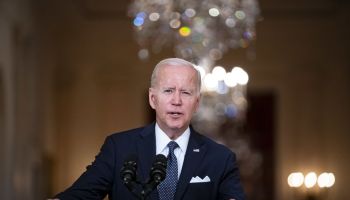The nation’s role in Afghanistan is getting more and more baffling as the war goes on.
By Fred Kaplan
These are not new questions. They have plagued this war from the beginning. The betrayals, the reversals, the various players’ multidimensional interests in the conflict, which have them working with the United States one minute and against us the next—even those who are well-versed in the game are seeing the wilderness of mirrors on the “AfPak” border as an increasingly impenetrable thicket. And the operative questions—who is friend, who is foe, where can common interests be found with either; in short, what can we do to foster a decent settlement of this war?—are, more and more, baffling.
The latest ratchet in this progression toward opaqueness occurred on Thursday, when Adm. Mike Mullen, the outgoing chairman of the Joint Chiefs of Staff, told a congressional committee that Pakistan’s Inter-Service Intelligence agency—the ISI—was behind the recent attack on the U.S. embassy in Kabul.
Well, actually, that’s not quite what he said, and parsing his actual words—as well as those of Pakistan’s official response—provide a hint of the shadowy games that all the sides are playing.
What Mullen said was that the embassy attack was carried out “with ISI support.” The logic here runs as follows: The attack was launched by the Haqqani network, a militant wing of the Afghan Taliban that’s particularly active in the area around Kabul; Haqqani has long been associated with the ISI (Mullen said Thursday that it “acts as a veritable arm” of ISI); and, in this sense, it’s valid to say that everything it does has “ISI support.”
Whether ISI had a hand in the embassy attack, or knew about it ahead of time, is less clear, officials say. There are factions within ISI, and there are believed to be factions within Haqqani.
Pakistan’s interior minister, Rehman Malik, issued a reaction to Mullen’s charge Friday, and it too is intriguing. “If you say that it is ISI involved in that attack, I categorically deny it,” Malik told Reuters, adding, “We have no such policy to attack or aid attack through Pakistani forces or through any Pakistani assistance.”
The italics are mine. Mullen, Malik well knows, didn’t quite say ISI was “involved” in the attack, nor did he charge there was some “policy” to launch such an attack, nor to do so “through Pakistani forces.” Malik’s response, in short, is a textbook case of a “non-denial denial.”
As for Secretary of Defense Leon Panetta, who appeared alongside Mullen at Thursday’s hearing, it is hard to tell whether his spin on recent events was evasive, delusional, naïve, or a combination of the three. The assault on the embassy, Panetta insisted, marks “a sign of weakness in the insurgency” Having been dealt a string of setbacks on the battlefield, the insurgents are now shifting tactics to go after “high-profile” targets, such as Afghan officials, peace negotiators, and the American embassy. This shift, Panetta said, will have no effect on the Taliban’s “odds of military success.”
These remarks are also worth some detailed parsing. It is certainly true that U.S. military forces have killed and captured a lot of insurgents in the past year or so, to the point where many rank-and-file Taliban fighters shirk direct confrontation. But the shift to “high-profile” targets is not a “sign of weakness.”
An insurgency war is, among other things, a competition for political power. One of the insurgents’ key strategic aims is to undercut the existing government’s legitimacy. The main way a government builds legitimacy is to provide its people with security. And a precondition for that is to prove that it is capable of protecting itself.
The advantage that insurgents hold (as every book on the subject recognizes) is that, when they meet resistance in one realm, they can easily switch to another. Assassinating officials, infiltrating peace talks (then assassinating the top peace negotiator), mounting an assault on the embassy of the government’s chief protector—these are classic techniques for disrupting a regime and sowing distrust among the people. The question of “military success”—the variable that Panetta said stands unaffected—is beside the point. The goal is political success, political power, to be achieved through whatever means are available.
Story Compliments Of Slate.com
















